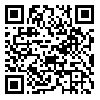دوره 17، شماره 1 - ( March 1397 )
جلد 17 شماره 1 صفحات 38-31 |
برگشت به فهرست نسخه ها
Download citation:
BibTeX | RIS | EndNote | Medlars | ProCite | Reference Manager | RefWorks
Send citation to:



BibTeX | RIS | EndNote | Medlars | ProCite | Reference Manager | RefWorks
Send citation to:
Shahabi S, Kamali M, Mobaraki H, Shafaroodi N, Saeedi H. Exploring the Challenges in Orthotics and Prosthetics Clinical Learning Environments: A Qualitative Study. Iranian Rehabilitation Journal 2019; 17 (1) :31-38
URL: http://irj.uswr.ac.ir/article-1-857-fa.html
URL: http://irj.uswr.ac.ir/article-1-857-fa.html
Exploring the Challenges in Orthotics and Prosthetics Clinical Learning Environments: A Qualitative Study. مجله انگلیسی زبان توانبخشی. 1397; 17 (1) :31-38
چکیده: (6050 مشاهده)
Objectives: The present study explored challenges in orthotics and prosthetics clinical learning environments in Iran.
Methods: A qualitative content analysis method was used to obtain data on orthotics and prosthetics clinical educator’s experiences. Qualitative data were obtained using semi-structured in-depth interviews involving 7 clinical educators; all selected by the maximum variation purposeful sampling method. Interviews continued until data saturation.
Results: During the interview sessions, notes and ideas were classified and assorted. The study themes were relationships, personal characteristics, facilities, and policies. Analysis of the qualitative data provided insights into the barriers to the desired delivery of clinical education services.
Discussion: The present research contributes to clinical educators’ experiences in respect of the clinical learning process. Clinical learning concerning orthotics and prosthetics education remains crucial. The findings emphasize the importance of listening to educators, and consider how relationships and contexts impact clinical learning. Understanding the challenges in clinical education environments has increased the quality of clinical education in orthotics and prosthetics field.
Methods: A qualitative content analysis method was used to obtain data on orthotics and prosthetics clinical educator’s experiences. Qualitative data were obtained using semi-structured in-depth interviews involving 7 clinical educators; all selected by the maximum variation purposeful sampling method. Interviews continued until data saturation.
Results: During the interview sessions, notes and ideas were classified and assorted. The study themes were relationships, personal characteristics, facilities, and policies. Analysis of the qualitative data provided insights into the barriers to the desired delivery of clinical education services.
Discussion: The present research contributes to clinical educators’ experiences in respect of the clinical learning process. Clinical learning concerning orthotics and prosthetics education remains crucial. The findings emphasize the importance of listening to educators, and consider how relationships and contexts impact clinical learning. Understanding the challenges in clinical education environments has increased the quality of clinical education in orthotics and prosthetics field.
نوع مقاله: پژوهشي |
موضوع مقاله:
مدیریت توانبخشی
دریافت: 1397/5/22 | پذیرش: 1397/10/8 | انتشار: 1397/12/10
دریافت: 1397/5/22 | پذیرش: 1397/10/8 | انتشار: 1397/12/10





